Ukraine Parliament Approves 50-Year Sanctions On Iran
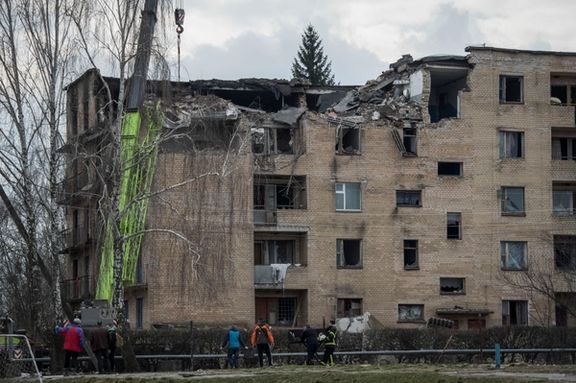
The Ukrainian Parliament approved the country’s National Security and Defense Council's decision to impose sanctions on Iran.

The Ukrainian Parliament approved the country’s National Security and Defense Council's decision to impose sanctions on Iran.
A massive 328 lawmakers voted in favor of the bill on Monday to endorse the decision to impose sanctions on Iran for 50 years for allegedly supplying Russia with weapons during its ongoing invasion.
"The resolution synchronizes Ukrainian sanctions with the actions of the entire civilized world on the path to the complete isolation of Iran," the parliament’s statement said.
Among the sanctions are a ban on trade, the transit of Iranian resources, flights, and transportation within Ukraine, according to Ukrainian media.
Additionally, any investment in Iran and the transfer of technologies and intellectual property rights by its residents will be banned.
Iranians will also be prohibited from using electronic means to conduct payments, while the Ukrainian National Bank will not be permitted to register international payment systems operated by Iran.
On Sunday, Ukraine's President Volodymyr Zelensky proposed a law seeking sanctions against Iran for 50 years after Tehran supplied Moscow with munitions and drones. Three days earlier he urged Iranians not to cooperate with Russia.
Iran has supplied hundreds of Kamikaze drones to Russia that have been used to target mainly Ukrainian infrastructure and civilians since September 2022. Tehran has denied that it has sent any drones to Moscow since the invasion of Ukraine began in February 2022, but Kyiv has presented overwhelming material evidence showing Russia has used Iranian-made Shahed drones.
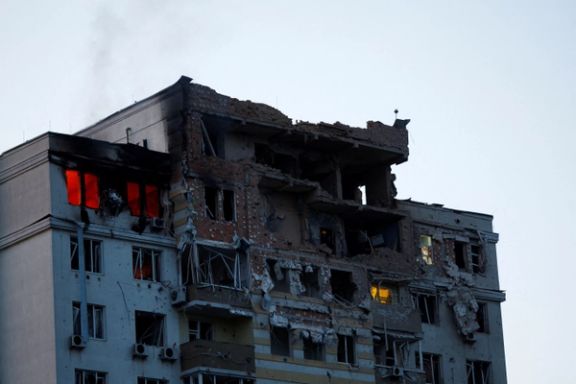
Russia launched its 17th mass air attack this month targeting Ukraine’s capital Kyiv, the third in as many days, this time using only Iranian-supplied drones.
Kyiv City Military Administration said that at around 5 am on May 30 several waves of Iranian Shahed drones were launched from different directions against the capital. No missiles were used this time.
"The attack was massive, came from different directions, in several waves," Serhiy Popko, head of Kyiv's military administration, said on the Telegram.
"A massive attack!" Kyiv Mayor Vitali Klitschko said on the Telegram messaging app. "Do not leave shelters."
Air defenses intercepted over 20 Shahed drones, but falling debris caused casualties and fires. Damage to a high-rise building in Kyiv’s Holosiivkyi District killed one person and injured three others, Kyiv Independent reported.
Russia has used hundreds of the Iranian supplied Unmanned Aerial Vehicles (UAVs) since last September to attack Ukraine’s infrastructure, civilian targets and try to overwhelm air defenses.
Russia has repeatedly attacked Kyiv in May using a combination of drones and missiles, mostly at night, in an apparent attempt to undermine Ukrainians' will to fight after more than 15 months of war.
Although the United States and its European allies have strongly condemned Iran for supplying drones and other weapons to Russia, major European countries have so far have only announced some sanctions but have not designated Iran’s Revolutionary Guard as a terrorist entity.
The air attacks come as Ukraine prepares a counter-offensive backed with Western weapons to try to drive Russian occupiers out of territory seized since Moscow launched its unprovoked invasion in February 2022.
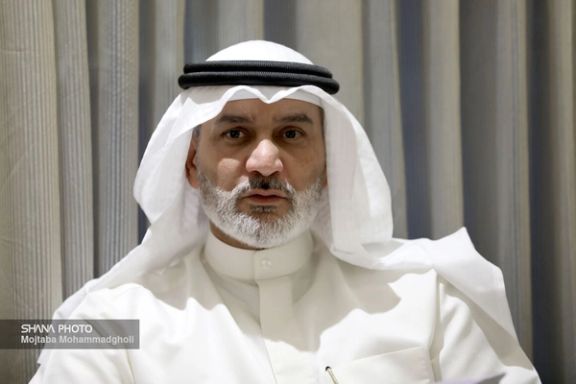
OPEC will welcome Iran’s full return to the oil market when sanctions are lifted, the secretary general of the Organization of the Petroleum Exporting Countries (OPEC) said Monday.
Iran is an OPEC member, although its oil exports are subject to US sanctions aimed at curbing Tehran's nuclear programme.
Secretary General Haitham Al Ghais, who is visiting Tehran for the first time, also told Iranian oil ministry's website SHANA that Iran has the capacity to bring on significant production volumes within a short period of time.
"We believe that Iran is a responsible player amongst its family members, the countries in the OPEC group. I’m sure there will be good work together, in synchronization, to ensure that the market will remain balanced as OPEC has continued to do over the past many years," SHANA's English-language website cited him as saying.
Although US sanctions can penalize any third party engaged in Iranian oil exports, Tehran ships daily close to one million barrels of crude to China, often disguised as cargos from third countries. Before the US imposed its sanctions in 2018 and 2019, Iran was exporting around 2.2 million barrels per day and in if sanctions are lifted Iran’s export capacity can hardly surpass that without major investments in the sector.
Saudi Arabia, the kingpin of OPEC, and Iran announced in March that they would restore diplomatic relations after years of hostility, in a deal brokered by China, the world's No. 2 oil consumer.
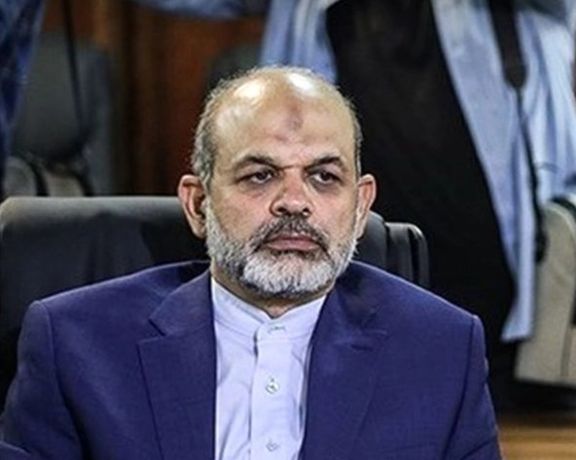
Two days after the deadly clash on the Iran-Afghanistan border, Iran's Interior Minister described the incident as a "brief conflict".
Ahmad Vahidi said Monday that "the issue was resolved after negotiations were held with the Taliban," playing down the severity of the clash.
"There was a cross-border shooting by the Afghan border guards, and naturally, they were given an appropriate response."
"Currently, there is no problem, and the border is open and in peace," added Vahidi.
Clashes at the border on Saturday over water rights claimed the lives of at least two Iranians and one Taliban soldier. According to a report by Iranian reformist daily newspaper Ham-Mihan, about 50 Iranians have been killed in border regions since 2020.
Despite Tehran’s claims that the clashes are over, and the situation is in control, Taliban sources have released videos of capturing an outpost inside Iran.
Earlier, Abolfazl Zohrevand, the former ambassador of Iran in Kabul, described the conflict as "a serious war" in an interview with Entekhab website saying that the conflict could be resumed.
On Sunday, Qasem Rezaei, deputy commander of Iran's Law Enforcement Forces and Kiumars Heydari, the Commander of the Iranian Army's Ground Forces, traveled to Sistan-Baluchestan province bordering Afghanistan to probe the situation.
Disputes between Tehran and Kabul have risen over the Taliban’s obstruction of Iran's access to Helmand River water in violation of a 1973 treaty.
Iran has accused Afghanistan's Taliban of violating a 1973 treaty by restricting the flow of water from the Helmand River to Iran's parched eastern regions, an accusation denied by the Taliban.

Israeli missile strikes targeted sites on the outskirts of the Syrian capital Damascus Sunday, while Syrian state media reported that some missiles were intercepted.
Citing a Syrian military source, SANA said missile strikes coming from the direction of the Israeli-occupied Golan Heights had targeted several sites it did not identify, adding that there were no casualties
"Our air defenses confronted the aggressors' missiles and downed some of them with only material losses," the Syrian military source said.
According to the Britain-based Syrian Observatory for Human Rights, two salvos of missiles were fired at a Syrian Air Force base housing militias of Iran-backed Lebanese group Hezbollah in Hafir Al-Foka area in Rif Dimashq, Al-Hama area and the area of Damascus International Airport.
Israel has for years carried out attacks on what it has described as Iran-linked targets in Syria, where Tehran's influence has grown since it began supporting President Bashar al-Assad in a civil war that started in 2011.
The strikes are part of an escalation of what has been a low-intensity conflict with a goal of slowing Iran's growing entrenchment in Syria, Israeli military experts say.
Fighters allied to Iran, including Hezbollah, now hold sway in vast areas in eastern, southern, and northwestern Syria and in several suburbs around the capital.
In April, Israel attacked targets in Syria hitting two bases where Iranian forces operate in Homs province earlier this month killing at least two Iranian officers.
Iran says its officers serve in an advisory role in Syria at the invitation of Damascus. Hundreds of Iranian forces and thousands of proxy militiamen including senior officers have been killed in Syria during the war.
(With reporting by Reuters)
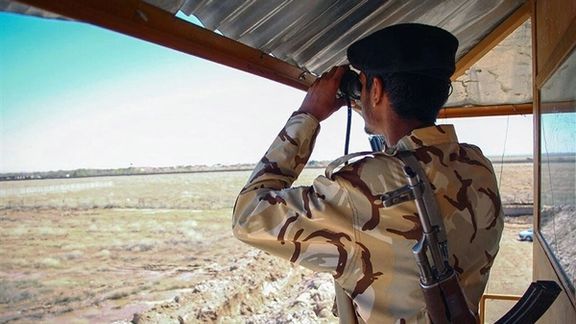
Amid escalating tensions with Afghanistan, the Iranian regime has sent senior military commanders to restive areas as the Taliban took control of aborder post.
Clashes at the border on Saturday over water rights claimed the lives of at least two Iranians and one Taliban soldier. According to a report by Iranian reformist daily newspaper Ham-Mihan, about 50 Iranians have been killed in border regions since 2020.
While Taliban forces gave thanks to God after allegedly seizing a guard post inside Iranian territory on Saturday, two senior Iranian military officials have been visiting the region.
Despite Iran saying the clashes are over and the situation is in control, Taliban sources have released videos of capturing an outpost inside Iran.
Qasem Rezaei, deputy commander of Iran's Law Enforcement Forces and Kiumars Heydari, the Commander of the Iranian Army's Ground Forces, travelled to Sistan-Baluchestan province bordering Afghanistan to probe the situation. Both officers are sanctioned by the United States.
Sistan-Baluchistan, with a hot and arid climate, is populated by less than 3 million people, most of whom are ethnic Baluch who are Sunni Muslims, in contrast with the Shiite majority in Iran. Poverty and under-development plague the region.
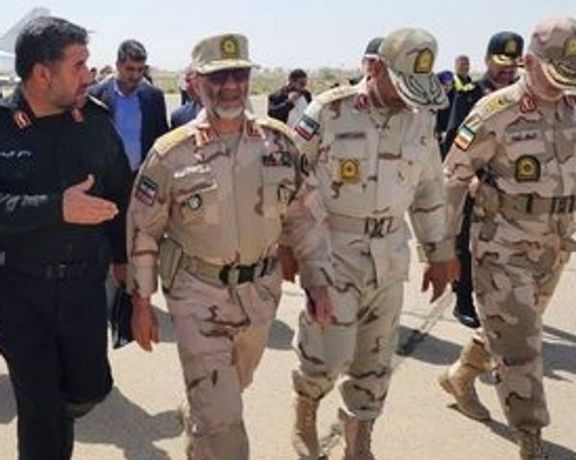
Heydari said, “The common borders with Afghanistan are fully under the control of the army's ground forces... and security is fully established,” adding that “it has been pointed out many times that our presence at the border does not mean that there is any danger threatening us, but … security is maintained at the borders.”
“There may sometimes be a difference between the two border guards, which is not an important issue, and the situation is completely under control,” he added.
“Our comrades in border guards and ground forces are completely dominant in the region, and as long as Afghanistan’s forces respect international regulations, we will show mutual respect and maintain the policy of good neighborliness,” but if the other side does not want to comply with the regulations, Iranian forces will encounter them, he said.
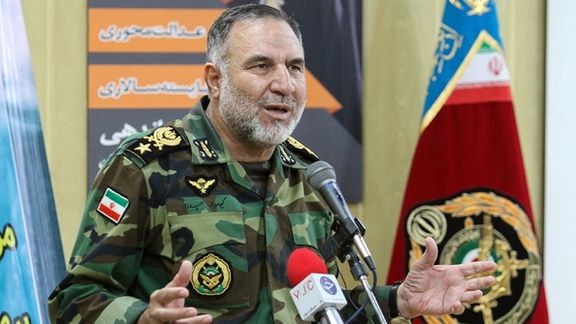
Mohammad Baset Dorrazehi, the former parliament member representing the province, said, “I said many times that local soldiers should be used for this region. Non-natives are not familiar with the environment and even in terms of climate, they cannot tolerate these conditions."
At least three sources from the Taliban confirmed to Afghanistan International that during the conflict, the fighters of this group had entered the territory of Iran. However, the Taliban did not confirm or deny the report of the capture of the Iranian outpost.
In response to Afghanistan International's question about reports on the clashes, a Taliban source said: "The Taliban do not joke in war."
The Taliban's Interior Ministry spokesman says the group does not seek to engage in a war with Afghanistan's neighbors.
Amid escalating tensions, Iran’s Border Guard and the Taliban exchanged heavy gunfire on Saturday on the Islamic Republic's border with Afghanistan. Iran says its forces inflicted “heavy casualties and serious damage”.
Disputes between Tehran and Kabul have risen over the Taliban’s obstruction of Iran's access to Helmand River water in violation of a 1973 treaty.
Iran has accused Afghanistan's Taliban of violating a 1973 treaty by restricting the flow of water from the Helmand River to Iran's parched eastern regions, an accusation denied by the Taliban.
"Today, in Nimroz province, Iranian border forces fired toward Afghanistan, which was met with a counter-reaction," spokesman for the Taliban-run interior ministry, Abdul Nafi Takor, said in a statement.
"The situation is under control now. The Islamic Emirate does not want to fight with its neighbors," the spokesman said, without identifying the victims.
A Taliban defense ministry spokesman said the Taliban "considers dialogue and negotiation to be a reasonable way for any problem. Making excuses for war and negative actions is not in the interest of any of the parties.”
Earlier in May, Iranian President Ebrahim Raisi warned the Taliban over disregarding Iran's water rights under the 1973 treaty. The Taliban rejected Raisi's perceived threat, with a former Taliban official mocking Raisi in a video that went viral.
Last week, Iranian media reported that five Iranian border guards were killed following a "terrorist" attack by several people who were trying to enter Iran from the Pakistan border.